STAR’s Reading FC Hall of Fame
The Hall of Fame is a work-in-progress project scheduled to complete on the 150th anniversary of Reading FC’s first match in 1872. Each year between 2016 and 2022 11-25 new names will be added (inducted) into the Hall of Fame.
In total there will be about 150 inductees fairly even spread across the 15 decades of the club’s history. Nomination is open to any individual that has played an exceptional or distinctive part in the life of the club. The Hall of Fame should not be seen as a ‘long service’ award. Specifically, it should include players, managers, officials, journalists and supporters.
A range of well-informed supporters has put forward initial recommendations to STAR. These have then been considered in terms of merit and popularity by a panel consisting of STAR Board members and outside experts who will determine the final selection of the latest round of inductees each year. Supporters are welcome to take part in future initial recommendation stages. Please email media@star-reading.org for further details.
1980s
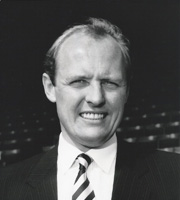
Roger Smee
Reading career: 1967-70 and 1973-74
62+4 appearances
17 goals
Claim to fame: Former player who saved and re-vitalised the club in its hour of need.
When Reading FC was threatened with extinction in the spring of 1983 it was former centre-forward Roger Smee who stepped up to the plate and saved the club from a ‘merger’ on most unfavourable terms with Robert Maxwell’s Oxford United. He was just 34 years old and less than 10 years away from the end of an injury-ravaged playing career. Under his chairmanship Reading achieved two promotions, the highest league placing for 60 years and victory at Wembley.
Read more...
Reading-born Smee did his football apprentice-ship at Chelsea before joining Reading in January 1967 and scoring on his league debut. As a bustling, blond centre forward he made an immediate impact with 9 goals in 15 matches (only one defeat) as Reading narrowly missed promotion in 1967. But injuries thereafter kept him in, and mostly out, of the team with his last appearance coming in November 1969 as Dick Habbin (another successful businessman in later life) took his shirt. He dropped down into non-league football with Hillingdon and Hereford and took the then unusual step of playing abroad with KV Ostend in Belgium. In October 1973 Smee had one last go at league football with Charlie Hurley’s goal-starved Biscuitmen but it didn’t work and this time he was replaced by Robin Friday.
Roger Smee trained for life outside football as a quantity surveyor and estate agent, soon forming his own Reading-based property company, Rockfort, which grew in strength in the late 1970s and early 1980s. Reading struggled terribly in 1982-83. The directors put the club up for sale and gates were sometimes below 2,000. In March 1983 it was announced that Robert Maxwell, the Oxford U chairman, would acquire the majority shareholding in Reading and merge the two clubs. Smee, and rebel Reading director Roy Tranter, led the successful fightback and by July 1983 he was in a position to become chairman of the club.
As a relatively young chairman Roger Smee was full of reforming and commercially-minded ideas in comparison with the moribund regime that preceded him. Out went the hooped shirts, Maurice Evans the respected manager (an unpopular decision) and the elms badge. In came plans to move the club from Elm Park to Smallmead, Ian Branfoot, the Royals Rendezvous bar, Trevor Senior, trophies, big transfers, records and promotions. It all ended in tears as the financial recession of late 1990 emptied Smee’s pockets and the club had to be rescued again, this time by John Madejski. But Smee’s six years not only saved the club but also revitalised its spirit with promotion from Division Four (1984), 13 wins from the start of the season (1985), promotion from Division Two (1986), highest-ever league placing (1987) and the Simod Cup victory at Wembley (1988).
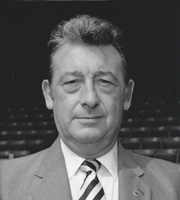
Roy Tranter
Reading career: Director 1983 and later President of RFSC / STAR
Claim to fame: Rebel director who played a key role in foiling Maxwell’s merger plan.
Roy was Reading born and a life-long supporter. He became a successful businessman in in the town after a long career with Reading Police. In 1983 Roy was a director on the Reading FC board under chairman Frank Waller. After Waller’s announcement that Reading and Oxford United were to merge Tranter played a leading dissident role from within the board to foil media mogul and United chairman Robert Maxwell in his plans.
Read more...
Tranter successfully applied for a series of injunctions that prevented the sale of shares and the creation of new shares thus creating valuable breathing space for Roger Smee to step in as the new chairman committed to keeping football in Reading. Tranter’s actions went some considerable way to saving the club.
He remained a friend to the club until his death in 2009 and accepted the honorary position of President of the Supporters’ Club, then of STAR in 2002. He is commemorated with a blue plaque outside the ticket office.
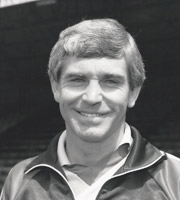
Ian Branfoot
Reading career: Manager 1984-89
Claim to fame: Two promotions, the Simod Cup and 13 wins from the start of the season.
Geordie-born Branfoot played for Sheffield Wednesday, Doncaster and Lincoln. Originally appointed as manager Maurice Evans’ assistant in July 1983, Ian was appointed first-team boss in January 1984. Branfoot sealed promotion from Division Four that season.
Read more...
Two years later his team’s direct, hard-working and all-action style led to a (still standing) league record of 13 consecutive wins from the start of the 1985-86 season and 62 points before New Year’s Day. Reading stormed to the Third Division title in 1986 to return to Division Two for the first time in 55 years and then reached the highest ever (at the time) league finish of 13th in 1987. Ian also led the club to its first Wembley appearance and a 4-1 Simod Cup triumph over Luton Town in 1988.
Branfoot was the first of the young “tracksuit” managers for the club. He employed a very simple 4-4-2 ethos at the club very effectively for his first five seasons but after relegation from Division Two in 1988 he was unable to repeat his success and left the club in October 1989. He later managed Southampton and coached at Crystal Palace.
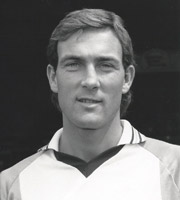
Martin Hicks
Reading career: 1978-91
601+2 appearances
26 goals
Claim to fame: Three promotions, the Simod Cup and the club appearance record.
Martin Hicks still holds the club record of 499+1 league appearances, 601+2 total appearances. He signed from Charlton in February 1978 for £3,000 having once been rejected by Reading after a trial. Over the next 13 seasons Martin was the club’s first choice centre-half and in his first full season in 1978-79 won a Fourth Division Championship medal.
Read more...
He won promotion again to the Third Division in 1983-84 and then captained the team to a Third Division Championship in 1985-86 and a Simod Cup triumph at Wembley in 1988. He was also in the Reading record-breaking teams that went 11 consecutive league games without conceding a goal in 1979 and had a 13 match winning start in 1985-86.
At 6ft 2ins he was dominant centre-half with a mighty clearance and also weighed in with headed goals from set pieces and thunderous free kicks. One of the more gentlemanly centre-halves of the era he took his fair share of knocks for Reading including two broken jaws. He finished his playing career at Birmingham City where he won promotion again. International honours came very late as a member of the England over-35s side for whom he once marked Paolo Rossi and Socrates in the Pele Cup!
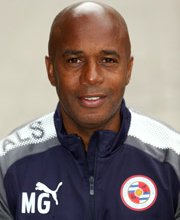
Michael Gilkes
Reading career: 1984-97
430+56 appearances
52 goals
Coach
Claim to fame: Much-loved super-fast winger who won promotion twice.
Michael Gilkes was one of the most popular players ever to wear the hoops, ‘Gilkesy’ arrived on a free from Leicester in July 1984. His searing pace on the left wing quickly made him a fans’ favourite, particularly with his second half dashes in front of the South Bank. He played a few times in the title winning 1985-86 side. Inconsistency led to boss Ian Branfoot switching him to left back in 1987-88 and after that he was virtually an ever-present in the team.
Read more...
After very brief loan spells with Chelsea and Southampton, Michael’s Reading career was revitalized under Mark McGhee as either a left winger or left back and he helped the club to the Division Two title in 1993-94 and the Division One play-off final in 1994-95. He was probably the fastest player ever seen at Reading to that point and made his mark in a speed competition at a national level. In 12 years playing he could outstrip nearly every full back that came his way. He was sold to Wolves for £150,000 in 1997 and later played for Millwall. Gilkes won 5 international caps for Barbados. He has since been with the club as Under 18 Academy coach and ‘Ambassador’. As U18 coach he helped the club to a record FA Youth Cup semi-Final position in 2013-14 and he is now (2018) an assistant manager at the club.
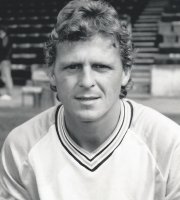
Stuart Beavon
Reading career: 1980-1990
Apps: 460+21
55 goals
Claim to fame: Skilful midfielder who scored vital penalties.
Stuart joined Reading in 1980 from Spurs and was a permanent fixture in the Reading team for the entire 1980s, mainly in the number 4 shirt. He was a cultured midfielder and dead-ball expert, scoring 55 goals in 460 appearances and creating countless more with his accurate free kicks and corner kicks.
Read more...
Beavon was the creator of many goals for the free-scoring promotion sides of 1984 (3rd in Division Four) and 1986 (Division Three champions) and converted the penalty at Wembley which put Reading on course to our famous Simod Cup win over Luton. He also netted a brace at Chesterfield the following season to prevent the club from a disastrous second relegation in two years.
Football was very much in Stuart’s blood. His father played for Oxford and his son for Wycombe. In retirement Stuart continued to live in the Reading area.
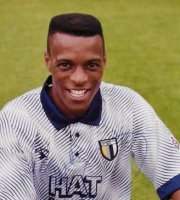
Steve Richardson
Reading career: 1982-1993
Apps: 449+8
3 goals
Claim to fame: Scored the goal that gave Reading the (then) highest League table finish
A tough tackling, fast, left back Steve made the number three shirt his own over an eleven-year career with the club, thanks to his consistency and enthusiasm. He signed from Southampton in 1982 and was a virtual ever present in the promotion seasons of 1984 and 1986 (the record-breaking 13 wins from the start of the season team) and the Simod Cup triumph in 1988. Despite standing only 5’5” he had an amazing leap and was a formidable opponent both on the ground and in the air.
Read more...
Steve only managed 3 goals in 449 appearances for Reading but memorably did score the goal away at Ipswich in 1987 that led Reading to our then highest ever league placing. He twice won the Supporters Player of the Season trophy and in 1984 was in the PFA 4th Division team of the year. Steve left the club in May 1993 and continued for local non-league clubs including, notably, Basingstoke Town.
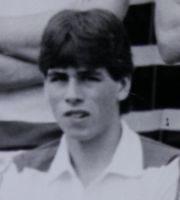
Neil Webb
Reading career: 1979-1982
72+9 appearances
22 goals
Claim to fame: Youngest ever player and goal-scorer who went on to a glittering career
Son of Dougie Webb, a Reading forward of the 1960s, locally born Neil was the youngest player to be selected, second youngest to play and youngest ever goal scorer. He was capped 10 times for England Youth and scored a hat-trick against Egypt in the 1981 World Youth Cup, so his talent was obvious at an early age. Neil was a highly skilful, attacking midfielder and the best Reading-born youth product in many years. He started in the no.8 shirt and worked his way back to no.4. In 1981-82 he was top scorer with 15 despite his midfield berth. It was a pity that Neil only played in an average and financially strapped Third Division side at Elm Park.
Read more...
By 1982 he was Reading’s youngest top scorer but that summer he moved to Portsmouth for a record fee of £87,500. He won the Third Division championship there before moving to Nottingham Forest in June 1985, for which Reading earned another £80,000. In June 1989 he moved on to Manchester U for an even larger fee of £1.5m. At Forest he won the League Cup and at United the FA Cup in 1990, the Cup-winners Cup in 1991 and the League Cup again in 1992.
He became the 1000th England player on his debut in 1987 and scored on his first start. In total he made 26 appearances for his country, scoring four goals, and was a member of the 1990 World Cup squad which finished fourth. Unfortunately he sustained a serious injury on England duty and was never quite the same player again. Nevertheless his career continued with further spells at Forest, Grimsby and Aldershot and approached 500 senior games in total. In retirement he returned to Reading and worked in various media roles.
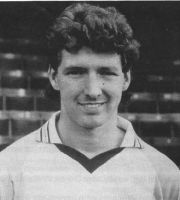
Trevor Senior
Reading career: 1983-1988, 1989-1992
351+11 appearances
190 goals
Claim to fame: Reading’s record goal-scorer of all time across all competitions
Trevor joined Reading from Portsmouth in July 1983 for £35,000 and was an immediate success with hat-tricks in his first two games at Elm Park. In the first of these versus Stockport County he scored the three in a club record time of 4 mins 17 seconds. He ended the 1983-84 season with a club record of 41 goals to become the first Reading player ever to be the League’s top marksman. He won a PFA Divisional award, an Adidas Golden Boot, a Rothman’s Yearbook award and promotion from the Fourth Division. In 1984-85 he had a run of nine consecutive scoring games, another club record. The following season Trevor scored 27 goals when Reading ran away with the Third Division title in 1985-86, starting with 13 consecutive wins.
Read more...
Tall and leggy, Senior was a born goal-scorer capable of netting with any part of his body, mixing the magnificent strike with either foot with the mundane tap-in.
In July 1987, after helping Reading stabilise in Division Two, he was transferred to Watford for a then record fee for Reading of £325,000. This transfer didn’t turn out well for either club. Trevor only managed one league goal for Watford and Reading, without his goals, were relegated. He then joined Middlesbrough in March 1988 and helped them win promotion to Division One via the play offs.
He did not settle in the north-east and he returned to Reading in October 1988, for a fee of £150,000. Yet again he was then top goal scorer for the next three seasons before being released in July 1992. Altogether he scored a club record of 190 goals in all senior competitions – but the only game he played in the famous blue and white hoops was a pre-season friendly in 1983!
Trevor remains one of the most popular players in the club’s history and not just for his goals. He had a real feeling for the club and its fans – and preserving his own records, one of which, very arguably, is the club’s best ever goalkeeper, statistically speaking! In four emergency appearances between the sticks, including his farewell appearance, he was unbeaten between the sticks. After Reading Trevor played and then managed in non-football.
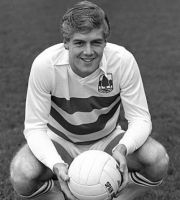
Kerry Dixon
Reading career: 1980-1983
124+9 appearances
57 goals
Claim to fame: A Roy of the Rovers centre forward in an ultimately doomed team
Rarely in the modern (to older fans!) era has one player so dominated a team or a striker have such a goals to games ratio in a mediocre side. Kerry was another of Maurice Evans’ great picks as a striker (think also Senior, Aldridge) signed from Dunstable at the age of 19 in July 1980. He had strength, pace and finishing skill in abundance.
Read more...
For three seasons he tried to keep Reading afloat in Division Three. The first two seasons ended with midtable finishes but the third was a spectacular disaster. He scored 8 in the first 6 games including 4 in an away match we lost 5-7. He then missed 11 games through injury, came back scoring 3 in the last 4 and almost saving us from relegation. Despite all that he topped the Division Three scoring charts – in a relegated side having missed a quarter of the season.
Obviously, he wasn’t going to stay. He moved to Chelsea for a record fee, enhanced by a further 10% when he made his England debut in 1985. Kerry became a true Chelsea legend and the first ex-Reading player to play for England in the World Cup Finals (1986). In total he won 8 England caps.
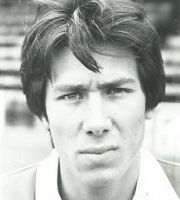
Lawrie Sanchez
Reading career: 1977-1984
289+16 appearances
31 goals
Claim to fame: Two promotions with us before an extraordinary career elsewhere
Lawrie boasts one of the most remarkable and varied football careers of anyone. He made his debut for Reading in 1978 whilst still at school (he needed the headmaster’s permission). In 1978-79 he was a first team regular, winning a Division 4 championship medal. But he was also the first footballer in modern times to complete a university degree course whilst playing professionally. He was also the first player to be sent off for handball!
Read more...
In his last full season with the club he was almost ever-present, second top scorer and a promotion winner from Division 4 (1984). Later that year he moved to Wimbledon where he found greater fame as the south London side began their incredible journey up the divisions, culminating in the historic FA Cup final win over Liverpool. By scoring the winning goal Sanchez became a footballing immortal.
He played international football for Northern Ireland and later managed them. He also managed in the Premier League with Fulham and guided third tier Wycombe to the FA Cup semi-final.
1990s
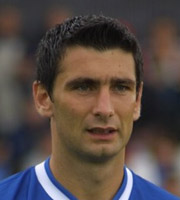
Ady Williams
Reading career: 1988-96, 2000-04
377+8 appearances
22 goals
Claim to fame: Mr Everywhere – he played at all levels and in every shirt.
Besides a fine and long career and a big personality Ady Williams grabbed more than his fair share of unusual records. He was the first player to play all the way through from schoolboy level to full international whilst on Reading’s books. He wore every number shirt from 1 to 14 in his Reading career, plus a very, very, brief spell as joint-manager and he netted the Royals’ 5,000 League goal. He is currently (2016) still with us as a leading football pundit on BBC Radio Berkshire.
Read more...
Reading-born Williams came through the Centre for Excellence, the precursor of the Academy, as a right winger before switching to full-back, aged 17. It took until the 1991-92 season for him to become established in the first team playing alongside Keith McPherson at centre back. Under Mark McGhee’s management Reading – and Williams – improved considerably and the Division Two title was won in 1994.
The following season Reading challenged strongly for promotion to the Premier League – even after McGhee departed mid-season, leaving the 24 year-old Williams one of four joint-managers appointed by John Madejski. Ady quickly renounced any claims on the boss’s chair and continued with his forceful and stylish centre-half play, often bringing the ball out into midfield. At 6 foot 2 he was strong in the air as well. By now, and by virtue of his father’s place of birth Ady was a Welsh international.
In the summer of 1996 Williams re-joined McGhee who was now managing Wolves. Injuries in the mid-part of his career restricted Ady to just 36 appearances at Molineux and in the spring of 2000 he came back to Reading on loan. It was a successful spell under Alan Pardew’s invigorating management and so in the summer he signed for a third time for Reading and won promotion again from Division Two in 2002.
In 2004 Ady left Reading for a successful spell with Coventry before seeing out his career at Millwall and Swindon, retiring in 2009. In total he made nearly 500 appearances for all clubs and earned 12 international caps. After trying his luck in management, mainly at a non-league level, Williams then focused on a career in media where his energy and perception paid dividends.
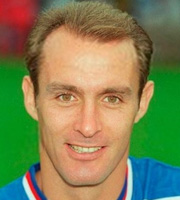
Jimmy Quinn
Reading career: 1992-97, Player-Manager
216 appearances
94 goals
Claim to fame: Scorer of beautiful goals and lots of them.
Signed by Mark McGhee from Bournemouth in July 1992 for a mere ₤55,000, the 32-year old Jimmy proved to be one of the club’s best-ever signings. Top-scoring with 23 goals in his first season, the following season Jimmy formed a deadly partnership with Stuart Lovell and scored 40 of their 62-goal partnership as Reading won the Division Two Championship. He was the leading League scorer that season.
Read more...
An astute, intelligent No. 9 with two good feet and brilliant in the air, Jimmy scored some memorable goals for the club, notably the over-the-shoulder volley against Wolves in April 1996 that secured Reading’s Division One survival. He was a particularly stylish and technically gifted player.
Quinn became joint player-manager with Mick Gooding after Mark McGhee’s sudden departure in December 1994 and this appointment lasted until the end of 1996-97 season. He then had spells with Swindon and Peterborough. Jimmy was a regular Northern Irish international and Reading’s most capped player for several years, until Kevin Doyle beat his record of 17 international caps whilst with the club.

John Madejski
Chairman 1990-2012: co-chairman 2012-17
Claim to fame: Completely transformed a third tier club and build a new stadium.
John Madejski (later Sir John) is one of several figures to rescue the club when it has been at death’s door but none has had such a lasting and dramatic impact. His longevity as the figurehead of the club even surpasses the first President, James Simonds (1871-95).
Read more...
The club was in desperate financial straits when Madejski became the major shareholder in November 1990. Within in a few years he came to own 95% of the shares and took the crucial decision to relocate the club from Elm Park, a ground which was no longer suitable for the modern age. In 1998 Reading FC moved to the stadium that bears his name, down by Junction 11 of the M4. With 24,000 seats and ancillary hotel, hospitality and conference facilities the stadium opened up the club to new audiences.
It took until 2002 for Reading to regain a place in the second tier but that status has been retained, or improved upon, ever since, the longest period in the club’s history at that level. Together that status and the stadium have enabled the club to grow attendances and reputation at a sustained level that has transformed the club. All this began in the 1990s with the first of several inspired managerial appointments in Mark McGhee (others later were Alan Pardew, Steve Coppell and Brian McDermott). McGhee’s side took the third tier title in style in 1993-94 while off-the-field it was the beginning of a family feel about the club and Madejski’s famously cautious financial management, all labelled ‘the Reading way’.
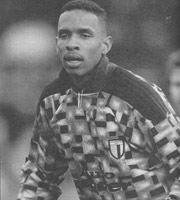
Shaka Hislop
Reading career: 1992-95, Goalkeeper
126 appearances
Claim to fame: Arguably Reading’s best ever keeper and a crowd favourite.
Shaka Hislop proved to be one of Reading’s best ever goalkeepers in the short period he was with the club. He took the often lurid and multi-coloured jersey permanently from Steve Francis at the start of the 1993-94 season and played 110 consecutive matches, winning a Division Two champions medal and finishing as a Division One runner-up before moving to Newcastle for £1,565,000.
Read more...
Though born in London Shaka came from the unlikely source of US college football, where he had been a student of aeronautical engineering. He made his Reading debut in September 1992. Tall, long and loose-limbed, agile and cool under pressure Hislop was an instant hit with the Reading fans who frequently sang “Shaka, Shaka, what’s the score?” In his two seasons as the first choice keeper he let in less than a goal a game and was a vital component in Mark McGhee’s attractive team that won Division Two in style in 1993-94. The following season Shaka played even better at a higher level making scores of stupendous saves that kept Reading in games they might otherwise have lost. The Elm Park men finished second in the second tier of English football, the highest position the club had ever reached at that point in time. Unfortunately Reading lost a dramatic play-off final to Bolton at Wembley in what was Hislop’s last game for the club.
After a period with Newcastle Shaka went on to play for West Ham and Portsmouth. Towards the end of his career he represented Trinidad and Tobago in the World Cup Finals of 2006 and later became a well-known broadcaster for ESPN.
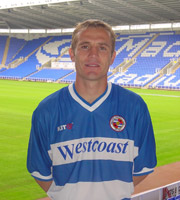
Phil Parkinson
Reading career: 1992-2002
392+23 appearances
23 goals
Claim to fame: Captain and the heart of the team in good times and not-so-good.
Phil Parkinson joined Reading in 1992 and spent 10 years at the club. He was named player of the season two years in a row (1997–98 and 1998–99) and was also a key member of the 1993–94 Division Two championship-winning team. He captained the team to promotion from the third tier in 2001–02. In a vote to compile the supporters best-ever XI, Parkinson was voted the best central midfielder for his hard-tackling, never –say-die style.
Read more...
Following retirement from playing in 2002, Parky went into management. He has enjoyed success in winning promotion with Colchester in 2005-06 and with Bradford City in 2012-13.He is the first ever manager to take an English fourth-tier league club (Bradford City) to the final of a major cup competition at Wembley, where they finished runners-up in the Football League Cup in 2013 and took City to the FA Cup Quarter Finals in 2015. He is currently manager of Bolton.
Phil Parkinson wore his heart on his sleeve and was fully committed to Reading through years both thick and thin. Rarely has the club had another tackler and captain like him. He was the last but one player to be awarded a testimonial match by the club and 20,000 turned up on a rain-soaked evening.
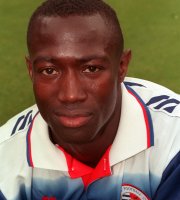
Keith McPherson
Reading career: 1990-1999
Apps: 307+10
8 goals
Claim to fame: Captain of the Division Two title-winning side of 1993-94
Keith was a product of West Ham’s famous youth academy. He joined Reading from Northampton in 1990 and was a regular choice at centre-back for the next nine years. Keith was the Reading captain under three different managers: Ian Porterfield, Mark McGhee and Jimmy Quinn/Mick Gooding.
Read more...
He was not especially tall for a centre-back but was quick and tough as teak and adapted to many different playing styles and defensive partnerships. Keith skippered the club to the Division Two championship in 1994 and so nearly into the Premier League the following season.
In total he played 307+10 games for Reading and scored 8 goals. From Reading he joined Brighton where he was also appointed captain.
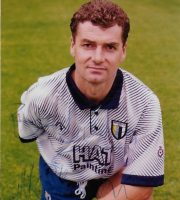
Mick Gooding
Reading career: 1989-1997
Apps: 356+12
30 goals
Claim to fame: Great midfield all-rounder who led Reading to play-off final
Mick was already a well-travelled 30 year-old Geordie when he signed for Reading in 1989 from Wolves but he was fit enough to still be playing League football at 40 (at Southend) with a total of 700 appearances under his belt. He was both tough and skilful in Reading’s midfield and a key component of Mark McGhee’s side that won the Division Two title in 1994 and just missed the Premier League in 1995.
Read more...
When McGhee suddenly left for Leicester in December 1994 Mick and Jimmy Quinn took on the unusual roles of joint-player-managers and guided Reading to the club’s first, and most tragic, play-off final defeat at Wembley against Bolton. With some outstanding talents sold off, the next two seasons were a struggle and at the end of 1996-97 Mick and Jimmy left the club – but still safely in the second tier.
To play 360 times having joined the club at the age of the 30 is a remarkable tribute to Mick’s drive and fitness. He has continued to live in the area and for many years been the co-commentator on BBC Radio Berkshire.
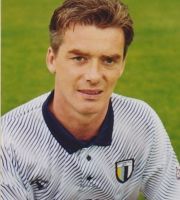
Kevin Dillon
Reading career: 1991-1994 and 1996-2004
118+1 Appearances
5 goals
Claim to fame: A truly class act in a promotion-winning midfield
Kevin was moving towards the veteran stage when he joined Reading in 1991 at the age of 31. Sir Alf Ramsey had given him his debut at Birmingham in 1977 and his early promise led to an England U21 cap and moves to Portsmouth and Newcastle. At Elm Park under Mark McGhee he was very much the midfield play-maker, controlling the tempo of the game and striking deep passes for Quinn, Lovell and Gilkes. Dillon was one of those players worth watching for style as well as content and the Division Two (third tier) title-winners of 1994 were one of the most popular and entertaining sides ever seen at Elm Park. Kevin left the club at the end of that season and saw out his playing career at Stevenage and Yeovil.
Read more...
He then returned to Reading in a youth coaching role and over the next decade held a variety of positions including assistant manager to Alan Pardew in the 2002 promotion season and to Steve Coppell in the 2006 promotion season and a spell as caretaker manager between the two. Later he had a successful stint as Aldershot manager and appeared as co-commentator on BBC Radio Berkshire from time to time before re-locating to his native Sunderland.
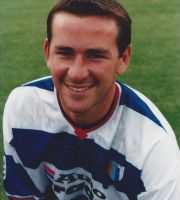
Stuart Lovell
Reading career: 1988-1998
204+62 Appearances
67 goals
Claim to fame: A moment best overlooked, to be fair!
Though an Australian by birth Lovell was always regarded as a local boy who grew up in the town and joined the club as a YTS trainee in 1988. It was at this point, under the tutelage of Bobby Williams, that he somehow acquired the nickname Archie which stuck with them thereafter.
Read more...
A clever forward with an accurate shot and an eye for goal Archie made his full debut in December 1990, Sir John Madejski’s first game as chairman and scored the game’s only goal. He gradually cemented his place as support striker in Mark McGhee’s improving side and in the Division Two title-winning season of 1993-94 missed only one game. His goal return in all competitions was 22. Archie adapted quickly to the higher level and scored 14 in all competitions as Reading finished runners-up in Division One and entered the play-offs for the first team. He scored twice in the semi-final victory over Tranmere and was by now playing alongside Lee Nogan rather than Jimmy Quinn who had been the established penalty taker. With Reading 2-0 up in the play-off final against Bolton Archie’s penalty, which could have made the game safe, was saved and tragically the Wanderers came back to win 4-3 in extra-time.
The miss didn’t affect the likeable Lovell’s popularity with the Elm Park crowd and in the spring on 1997 he was involved in another dramatic moment with a far more positive ending. Trailing to the only goal in a needle match with McGhee’s Wolves Archie popped up twice with goals in injury time to secure a memorable victory. He left the club at the end of the 1997-98, thus just missing out on playing at the Madejski Stadium, and joined Hibernian.
At Easter Road he won promotion with Hibs, and two caps for Australia, and then captained Livingston to their first major honour in the Scottish League Cup of 2004. In retirement in Scotland he has worked for the PFA and in various media roles.
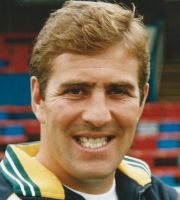
Mark McGhee
Reading career: 1991-1994
36+14 Appearances
7 goals
Claim to fame: Took us to our highest point yet, in brilliant style
Mark McGhee was famously appointed as player-manager in May 1991 on the strong recommendation of Alex Ferguson, his former boss at Aberdeen. As a 34 year-old striker McGhee didn’t exactly set Elm Park alight and he retired from playing in 1993. But as a manager he brought in some interesting loan deals (Steve Archibald, Jim Leighton) and slowly and with not much money built an attractive team that began to flourish in the spring of 1993, falling just short of the third tier play-offs.
Read more...
All the pieces came together for the next season. With Shaka Hislop in goal, Kevin Dillon controlling the midfield and Jimmy Quinn knocking in 39 goals Reading fans were having a ball. The third tier title was won in style.
Remarkably, rather than rest on his laurels, McGhee made major changes to the team, bringing in Simon Osborn and Darius Wdowczyk and making the style of play more sophisticated. Unexpectedly Reading were in a promotion chase for the top division for the first time ever!
McGhee’s managerial abilities had been noticed and in December 1994 he was lured away by Leicester City in a move that caused an immense amount of rancour and was seen in Reading as an act of bad faith. Soon McGhee moved on to Wolves and the Reading crowd took immense delight in several victories over his team – which caused him to bridle. Maybe this award might start to heal those wounds?
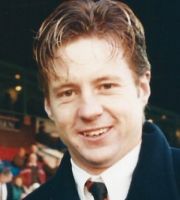
Dylan Kerr
Reading career: 1993-1995
84+5 Appearances
5 goals
Claim to fame: Won everything in 1993-94 including trademarked shirt over his head goal celebration
Dylan Kerr was at the club basically for only two seasons but what seasons they were. Signed as left back in 1993 by Mark McGhee, Dylan was a star of the third-tier title-winning team of 1993-94. He missed just one game and scored a couple of cracking long-range goals. He was voted Player of the Season and made the PFA Divisional side too.
Read more...
Playing at the higher level he adjusted well and was a key member of the side that finished as runners-up in the second tier, but he missed the play-offs due to injury. The following season injuries curtailed his Reading career, but he remained an unusually (for an ex- and non-local player) avid fan of the club, often seen even a decade later joining the Reading contingent at away games.
2000s
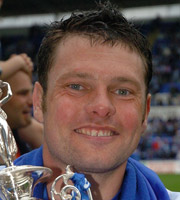
Graeme Murty
Reading career: 1998-2009
321+12 appearances
2 goals
Claim to fame: Captain of the “106” team and all-round good guy.
Despite an injury-blighted start to his Reading career Graeme Murty persevered to become one of the all-time fans’ favourites. He captained the club from right back in the years 2005-08 as Reading won promotion to the Premier League and then achieved the club’s highest ever league finish in 2007. In his time at Reading he was an active charity fund-raiser and ambassador for the club – as well as a notoriously infrequent goal-scorer!
Read more...
Murty’s magic moment came in the final match of the 2005-06 season when Reading were awarded a late penalty. A goal and Reading would set a new Football League record for the most points won in a season. Murty’s only other goal, a screamer to be fair, had come five years earlier. With the chant of “he knows he is, he’s sure he is, he’s M U R T Y” ringing around the capacity crowd in the Madejski stadium stepped up to score amid wild celebrations.
He joined Reading in 1998, as a Tommy Burns signing, from York City where he had often played on the right wing. Playing in a pre-season friendly in July 1998 gave him the distinction of being the last Reading player to play at both Elm Park and the Madejski Stadium. Long spells out with injury restricted him to just 40 starts in his first three seasons. Thereafter he had five seasons as the regular right back, tough and tenacious in defence and overlapping to good purpose in attack. In the first of those seasons Reading won promotion back to the second tier (2002) and Murty was voted Player of the Season and into the PFA Division Two ‘Team of the Year’.
After Phil Parkinson left in 2003 he was appointed club captain. A well respected skipper among the players and fans, he led the club to the Premier League as Championship winners in 2005-6. He was voted supporters ‘Player of the Year’ again in 2003/04. During his time at Reading he played 4 times for Scotland. Murty will also remembered as an ambassador with all of his charity fund-raising and work in the local community. During his time at Reading he played 4 times for Scotland, the country of his father’s birth, Graeme being a Tees-sider. He left Reading in 2009 and joined Southampton, after a loan spell at Charlton. At Southampton he worked in the youth development areas and in 2014 took a similar position at Norwich City. He has also made numerous regional and national TV appearances.
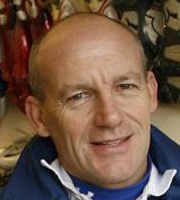
Steve Coppell
Reading career: Manager 2003 – 2009
Claim to fame: managed Reading to new record heights.
Steve Coppell was appointed manager of Reading in October 2003. His first two seasons resulted in a top 10 position. Then Reading dominated the Championship in 2005–06, setting a new second tier record of 33 league games unbeaten. On 25 March 2006, before the clocks went back, Reading clinched promotion to the top flight for the first time in the club’s history. Coppell’s team secured the league title in the following week and go on to set a new Football League record for the number of points won in a season with 106.
Read more...
Following such an outstanding season, Coppell was voted League Managers Association’s Manager of the Year for both the Championship and the entire league, and also topped the Tissot League for Managers’ Performance. In 2006-07 Coppell won the Manager of the Month awards in September and November. Reading finished their first season in the English top flight in 8th place, just one point short of UEFA Cup qualification. In recognition of this performance, Coppell won the Manager of the Year award for the second season in succession.
Reading’s second Premiership season ended in relegation. But when he threatened to resign, Reading fans, en masse, launched a successful protest to convince Coppell to stay at the club. Reading eventually finished the league in 4th place but lost their play-off semi-final against Burnley. Coppell resigned as manager immediately after the game.
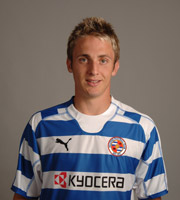
Kevin Doyle
Reading career: 2005-2009
146+17 appearances
56 goals
Claim to fame: Young striker who inspired Reading to the Premier League and then shone in it.
Kevin Doyle signed for Reading, as a young striker, in June 2005 in what was an extraordinary year for him. He won a Championship medal in both Ireland and England for that season. Doyle was the true definition of a bargain buy costing the club £78,000, had four brilliant seasons and left for a fee of £6.5m to Wolves.
Read more...
An immensely strong, skilful, fast forward and good in the air too, Kevin won Player of the Season at 21 in the club’s famed 106 points season (2005-06) and was in the PFA Divisional team of the season. He adapted instantly and well to the Premier League, scoring 13 goals in an injury-hit season and attracting the interest of major clubs. A highly personable and loyal character he stayed with the club during more difficult times including relegation in 2008 and the narrow failure to climb straight back up (2009).
In his first season at Reading he broke into the Ireland national team and ended his international career on 62 caps, having twice been captain of his country. His club career after Reading was a tough battle playing upfront on his own in a struggling Wolves side and a variety of injuries led to his retirement, whilst at Colorado Rapids, at the age of 34.
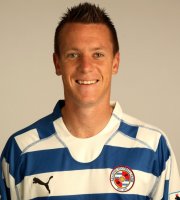
Nick Shorey
Reading career: 2000-09 and 2012-13
Apps: 316+1
14 goals
Claim to fame: Reading’s first full England international for over a century
Nicky joined from Leyton Orient in 2000 as a young left-back and developed into such a strong player he became the first Reading player in over a century to play for England, winning two caps in 2007.
Read more...
Slightly built and with excellent ball control Nicky was an attacking full-back in the record-breaking ‘106’ side and won a place in the PFA divisional team of the year. His inspirational burst down the wing turned Reading’s first game in the Premier League against Middlesbrough and he scored many fine goals with pinpoint free-kicks.
Shorey joined Aston Villa in 2009 for a large fee and later played for WBA before making a brief return to the Madejski Stadium in 2012-13 on a free transfer. In total he made 311 appearances, scoring 13 goals.

Ivar Ingimarsson
Reading career: 2003-2011
Apps: 276+7
11 goals
Claim to fame: Player of the season in Reading’s Premier League debut season
Ivar was an experienced international defender with Iceland when he joined Reading from Brentford in 2003 for a bargain fee of £175,000. He gave the club eight years great service before finishing with a brief spell at Ipswich. Together with Ibu Sonko Ivar formed a formidable defensive barrier in the famous 2005-6 season. Ivar was ever-present and never booked, a remarkable feat for a centre-back and he was seen as the rock of the side.
Read more...
He adapted so well to the Premier League he was voted Player of the Season in 2006-07 and in 2009 became club captain. One last highlight was playing in Reading’s shock FA Cup victory at Anfield in 2010. In total Ivar played 251 times, scoring 11 goals and was part of a notable Icelandic contingent at the Madejski Stadium. He now manages a club in Iceland.
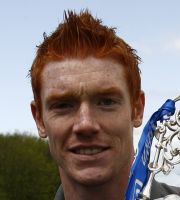
Dave Kitson
Reading career: 2003-2009
Apps: 130+29
62 goals
Claim to fame: Scoring Reading’s first Premier League goal and being the scourge of West Ham
One of Steve Coppell’s great bargain signings Dave joined Reading from Cambridge in 2003 for £150,000. As a tall, skilful centre-forward, good in the air and on the ground, he scored goals a-plenty, particularly against West Ham!
Read more...
He was a key figure in the ‘106’ team and then scored Reading’s first-ever Premier League goal against Middlesbrough. But an injury in that game meant he missed half the season. When the 2007-08 season ended in relegation Dave joined Stoke for a fee of £5.5m but life there didn’t work out well. He returned briefly to Reading on loan in 2009 and later played for Portsmouth and Sheffield United.
As a late entrant into the professional game Kitson was often able to take a sideways look at some of its practices and made a number of intriguing comments to the media. It is strongly rumoured he had a hand, at least, in ‘The Secret Footballer’ series of books.
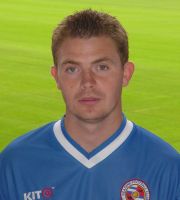
Jamie Cureton
Reading career: 2000-2003
89+38 appearances
55 goals
Claim to fame: The goal that launched Reading into the top divisions and his own name into space
Jamie caught the attention of the Reading faithful by scoring four for visiting Bristol Rovers in a record 0-6 home defeat in 2000. At the start of the following season he joined our club for what was always remembered in song as ‘a bargain’ fee and was an immediate hit in front of goal. He scored 30 times as Reading narrowly missed promotion, losing in the Division Two play-off final to Walsall at Cardiff. Small in stature and not especially quick Jamie was blessed two goal-scoring assets – the ability to be in the right place at the right time and unusually accurate chipped or lobbed long shot.
Read more...
The following season he executed such a shot from the edge of the six yard box with complete precision into the corner of the Brentford net with twelve minutes to go. Without that goal it would have been Brentford, not Reading, who finished as promoted Division Two runners-up. Whenever we play the Bees the ‘Jamie Cureton, what a bargain’ chant always gets an airing. STAR (Supporters Trust At Reading) was launched during this promotion spring and as part of our publicity and celebration we had a newly discovered star in the Perseus constellation named after him. The following season Cureton helped Reading into the Division One play-offs before leaving to take an opportunity in South Korean football.
For Jamie three seasons at the Madstad represented a long stint. He has become the very definition of a nomadic footballer, a 21st century ‘have boots, will travel’ striker. Jamie has represented 13 league clubs and from 2016 continued to ply his trade at non-league level. Now 45 (2021) he is currently player-manager at Enfield. He is one of the few footballers in the world to have made over 1000 competitive appearances in which he has scored over 350 goals. Way back in his youth he played for England at U18 level.
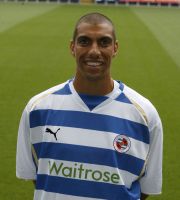
James Harper
Reading career: 2001-2009
314+34 appearances
26 goals
Claim to fame: A key figure in the 106 team with two promotions to his name
At the age of 20 James joined Reading from the Arsenal youth ranks for a fee in the region of £400,000. He made a scoring debut against Rotherham in February 2001 and played a part in our promotion from Division Two (third tier) in 2002. James was predominantly a deep-lying midfielder who played with great composure and fantastic energy. James was voted Player of the Season in 2002-03.
Read more...
He came into his own in the hooped shirt at the higher levels, a vital component of the 106 team that won the Football League in 2006 with a record points total and then finished 8th in the Premier League in 2007. During that season Harper scored goals at Newcastle that would have propelled Reading to third place in December if the defence had held out! The following season he scored a memorable goal at the Madejski Stadium as Reading beat Liverpool 3-1. Over the two Premier League seasons he was an ever-present.
After the failure to bounce straight back after relegation in 2008 it was obvious James had to move on. Subsequently he joined Sheffield U and Hull City. His love of the game sees him still playing (2020) at non-league level with Uxbridge.
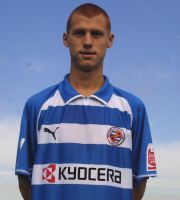
Steve Sidwell
Reading career: 2003-2007
182+5 appearances
30 goals
Claim to fame: Dynamic heart of the 106 team
Steve was poached by Alan Pardew from under the noses of rivals Brentford and Brighton where he had played on loan. His transfer involved a large fee to his parent club Arsenal which he had joined at the age of nine. His promise as a youth earned Steve five England U21 caps.
Read more...
Sidwell was a dynamic, strong-running, goal-scoring midfielder in the mould of Bryan Robson and a vital, almost ever-present, cog in the Reading team which reached the play-offs in 2003, won the Football league title in 2006 and finished 8th in the Premier League in 2007. He was twice named in the divisional PFA Team of the Year – 2005 and 2006 and in his final season at Reading attracted interest for the very top clubs.
In 2007 he moved to Chelsea and over the course of his career played for another four Premier League clubs – Fulham Aston Villa, Stoke and Brighton where he finished his career and now (2020) works as a club ambassador. In total he played over 500 first team games – and the club he appeared for most frequently was Reading.
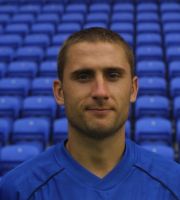
Nicky Forster
Reading career: 1999-2005
157+30 appearances
59 goals
Claim to fame: The one-man forward line that literally shook the Madejski Stadium
Probably the best one-man forward line Reading have ever had! Nicky Forster used his searing pace and extreme guile as Reading battled their way out of the third tier and on to the edge of the top tier. He signed from Birmingham C in the middle of the 1999-2000 season and along with Martin Butler, transformed the attack of a relegation-threatened side. We finished 10th!
Read more...
Forster’s most dramatic moment came in the play-off semi-final 2nd leg against Wigan. Coming on as a late sub, after a long injury, he helped turn a one goal deficit into a 2-1 win inside three minutes as the East Stand literally shook with excitement. Sadly, Nicky suffered some bad injuries, none more devastating than in the 2003 play-off semi-final at Wolves, an injury that turned the tie.
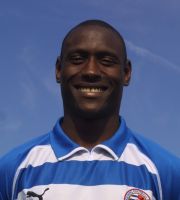
Ibrahima Sonko
Reading career: 2004-2008
122+5 appearances
8 goals
Claim to fame: Superman defender capable of saving shots even with his face!
Otherwise known as ‘Superman’ – a nickname he picked up when saving a goal-bound shot with his face. But he had the build for the role – tall, fast and massively strong, he was almost unbeatable in the air. Ibu joined from Brentford in 2004 and was nearly ever-present until sustaining a bad knee injury in January 2007.
Read more...
In that two-and-a-half year spell Reading finished 7th, then won the Championship in record style and then made a fine start to life in the Premier League. Sonko’s physical presence and all-action style made him great favourite with the fans. It was an immense pity that he never fully recovered from injury but he did go on to play for Stoke and Ipswich among others – and make 5 international appearances for his native Senegal. For Reading his total was 136 appearances, 8 goals.
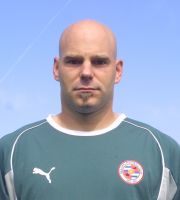
Marcus Hahnemann
Reading career: 2001-2009
282 appearances
Claim to fame: Kept every shot out of the North Stand goal for a full year
A dominant and forceful presence between the posts from 2001 to 2009 Marcus was a crucial member of the 106 team. He came to Reading from Fulham without much first team football under his belt but adapted superbly to the challenge. Marcus was strong on crosses and distribution and once (2005 to 2006) went a whole calendar year without conceding a goal at the North Stand end of the Madstad!
Read more...
He was capped by USA, part of their 2006 World Cup squad and later moved back to the PL with Everton.
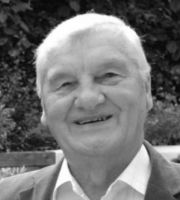
Ron Grant
Reading career: 1993-2009
kitman
Claim to fame: Supporter, kitman, mentor and club elder
For long-time supporter Ron Grant his involvement with the club was a fan’s dream come true. He started helping the club out in Mark McGhee’s time and, as the club succeeded, his role grew. He spent 16 years – including Steve Coppell’s glory years – as the kit-man (and confessor and mentor to players) and a positive force in the backroom.
Read more...
Ron now has a leading role in the RFC Former Players Association and has been an invaluable help to the Hall of Fame by producing contact details for ex-players. He’s also a frequent and jovial presence in the local media.
2010s
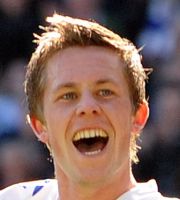
Gylfi Sigurdsson
Reading career: 2005-10
51 appearances
23 goals
Claim to fame: Best graduate yet to emerge for the Reading FC Academy.
Gylfi Sigurdsson is probably the most significant graduate yet to emerge from the Academy at Reading. He joined the club as a scholar in 2005 and made his first team debut in 2008. After loan spells at Shrewsbury and Crewe he made such an impact in 2009-10 he was voted Player of the Season at the age of just 20.
Read more...
Reading reached the FA Cup quarter-final that season for the first time since 1927 and Gylfi scored against Premiership opposition in every round on the way to that stage, including a coolly taken last minute penalty at Anfield.
Sigurdsson was a technically accomplished attacking midfielder with quick, clever feet, an eye for the defence-splitting pass and a strong and accurate shot. He signed a new three year deal in May 2010 but left for a record transfer sale fee for Reading (still standing) of about £8m to join Hoffenheim in Germany.
It wasn’t long before he returned to the UK to join Swansea, later moving to Tottenham and then re-joining Swansea. Gylfi was also an integral part of the Iceland national team that qualified, against the odds, for Euro 2016 and then against greater odds still, reached the quarter-finals, beating England on the way.

Nick Hammond
Reading career: 1995-98 and 2003-15 Director of Football
33 appearances
Claim to fame: Behind the scenes architect of our greatest period ever.
After playing for Arsenal and Swindon and a short spell at Plymouth, Hammond joined Reading on loan in December 1995, with the move being made permanent for £40,000. A highly regarded goalkeeping coach, Hammond was handed a coaching role by Alan Pardew and he subsequently retired from playing after suffering a recurrent back injury. He finished on just 99 league matches, his final game being at the Madejski Stadium against Colchester in 1998.
Read more...
In October 2000, Hammond took over from John Stephenson as Reading’s Youth Academy Director, and was appointed the Club’s first-ever Director of Football in September 2003. Since then he has seen a number of former Academy players break into the first team squad both at Reading and other League clubs and making a career in professional football. In his 12 years as Director of Football he has overseen the appointment of 5 team managers and 2 caretaker-managers and overseen Reading’s rise to the Premier League.
Nick was the highly regarded Director of Football during the club’s most successful period, a great transfer negotiator and a good friend to fans. He came to STAR’s launch meeting in 2002. Hammond left the club in 2016 to take up a role at WBA.

Eamonn Dolan
Reading career: 2004-16 Academy Manager
Claim to fame: The leading influence behind the club’s hugely successful Academy.
Eamonn Dolan’s playing career as a striker with West Ham, Birmingham and Exeter was to last only six years and fewer than 50 appearances but he made a much bigger mark on the game as a coach and in youth development.
Read more...
Dolan joined Exeter in 1991, marking the beginning of a 13-year association with the club, although he only managed 26 league appearances for the club before his career was cut short in 1993 when he developed cancer. He continued to serve the Grecians as football in the community officer, youth coach, caretaker manager, and finally full-time manager, taking over after the club’s relegation from the Football League in 2003.
His first season in charge was fairly successful, steadying the ship after a difficult year, and almost qualifying for the playoffs, but he left the club in September 2004 to join Reading as Academy manager, where he oversaw a glittering period of youth development at Madejski Stadium, with players such as such as Alex McCarthy, Alex Pearce, Gylfi Sigurdsson, Jem Karacan and Hal Robson-Kanu coming through the ranks and making important contributions for the club. In all 18 Academy graduates made the first team in his time.
Following the departure of Brian McDermott in 2013 Eamonn had a brief period as the club’s caretaker manager before the appointment of Nigel Adkins. Eamonn sadly passed away 20 June 2016 following a further battle with cancer. The North Stand at the Madejski Stadium was re-named in his honour. At the time of his death four of his Academy proteges were playing in the European Championships.
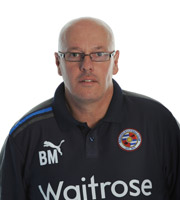
Brian McDermott
Reading career: 2009-2013; 2015-16 Manager
Claim to fame: Characterful manager who created an unexpected success.
The former Arsenal winger’s association with Reading began in 2000 when he was appointed chief scout. After a period managing Slough Town Brian re-joined Reading and worked in a variety of coaching roles before being appointed caretaker-manager in December 2009. His success in this role, including an FA Cup victory at Anfield, led to the appointment being made permanent.
Read more...
McDermott guided the club to the FA Cup quarter-finals in 2010, for the first time in 83 years and then did it again the next year. He also reached Wembley, losing a dramatic Championship Play-off Final against Swansea in 2011. The next season Reading won the Football League Championship, in a close finish above Southampton and West Ham, and Brian won the divisional Manager of the Year award.
Financial and strategic difficulties arising from a take-over hamstrung the club’s return to the Premier League and McDermott’s men struggled almost throughout – the exception being January 2013 when Brian won Premier League Manager of the Month. Five weeks later he was sacked ahead of the inevitable relegation. He returned for a six month spell from December 2015 but could not conjure his old magic out of a very different set of players. McDermott’s title winners of 2012 played a fast and energetic brand of 4-4-2.

David Downs
Club historian and Academy official
Claim to fame: an absolute enthusiast for all things to do with Reading FC
David is one of the best-known and longest standing Reading supporters but more than that he has been involved with the club as its official historian and its youth development. His book ‘Biscuits & Royals’ published in 1984 was the first full-length history of the club and he has continued to write articles for the club programme over many years. David has collected all kinds of memorabilia including most famously the water in which the Simod Cup final-winning shirts were washed!
Read more...
As a teacher and later headmaster Downs was involved for many years in the Reading Schools football team. After retiring from teaching David went to work for the club in a variety of roles including Education Officer and Youth Protection Officer, finally retiring at the age of 75 in 2018. However, he continues to commentate on Hospital Radio Reading broadcasts from home matches.
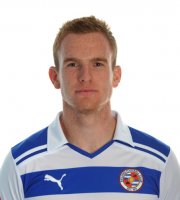
Alex Pearce
Reading career: 2005-2015
Apps: 228+12
15 goals
Claim to fame: Academy product who went on to win club and international honours
Despite being a relatively local boy (born Wallingford) Alex has played international football both for Scotland and Ireland (7 full caps to date for the Irish)! Pearce is a real Reading Academy product from a young age who captained a youth side to the PL Cup win 2007 over Manchester City. He spent loan periods at four League clubs before staking a first team berth at the heart of the defence in 2009-10. He was ever-present in the title-winning side of 2012, scoring 5 goals and winning Player of the Season.
Read more...
Alex was a strong, dominant centre-half, good in the air and tough on the ground but also a fine ambassador for the club. After 240 appearances, 15 goals, for Reading he moved to Derby County where he continues to be a fine defender.
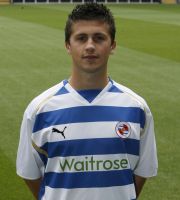
Shane Long
Reading career: 2005-2011
120+85 appearances
54 goals
Claim to fame: An extraordinary rise to fame and success in front of goal
After playing only once for Cork, Shane moved to Reading aged just 18, in the deal that also brought Kevin Doyle to the Madejski Stadium. He made his Reading debut on New Year’s Eve 2005 and scored late on to maintain a long unbeaten record.
Read more...
An immensely strong and energetic forward, fast, with a good spring and never say die attitude Shane was a popular find. Among his many talents he was also gifted musician and first person to play both Gaelic and Association football at Croke Park Dublin.
Long enjoyed promotion to the Premier League with Reading, being part of our 2005-06 title-winning season. He was nominated as the Football Association of Ireland Young Player of the Year for 2007 and won it in 2010. He made 50 appearances in the Premier League but really established himself as the front-line striker from 2008 in the Championship. In 2010-11 he was voted Reading’s Player of the Year on the back of a 21 goal haul. Sadly the play-off final defeat at Wembley was almost Shane’s last game for the club and he moved to West Brom for a fee of over £5m. Subsequently he’s remained in the Premier League with Hull C and Southampton – though members of his family are still keen Reading fans! In January 2021 he joined Bournemouth on loan.
First capped for Ireland in 2007 Shane has gone on to win 82 caps at time of writing (2020) and scored memorable goals against England, Germany and Netherlands and captained his country. He’s also on record as scoring the fastest ever (2020) Premier League goal and fastest ever by a Premier League sub coming on!

Jobi McAnuff
Reading career: 2009-2014
198+8 appearances
16 goals
Claim to fame: Inspirational captain of Football League champions
Jobi joined Reading from Watford in 2009 as a 28 year-old left-sided midfielder/ winger with experience at five other clubs and as a Jamaican international. As a regular in Brian McDermott’s team he saw Reading make steady progress away from the depths of the Championship. The club reached the play-off final in 2011 and the following season won the Football League with an incredible late burst of form. Jobi was the captain of the team and an inspiration to the younger players around him.
Read more...
He played a steady game, keeping the midfield ticking, frequently laying on assist for team-mates and infrequently scoring the odd great goal, none better than the dribble and finish in the play-off semi-final at Cardiff in 2011.
In 2014 he left Reading for Leyton Orient and after a spell at Stevenage returned to Orient where he captained them to the National League title and a return to the Football League. In March 2021 he was appointed manager of the O’s.
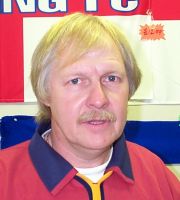
Colin Bishop
Reading career: 1958-to date
Supporter
Claim to fame: Virtually part of the DNA of the club for decades
Colin comes from a family of Reading supporters and is responsible for creating a few more! He is as near as you can get to being the part of DNA of the club. An electrician by profession he was sometimes scaling the Elm Park floodlights and later worked on the electrical installations in the building of the Madejski Stadium.
Read more...
Colin joined the Supporters’ Club committee in 1974 and was sometime Secretary and has been a Board member of STAR continuously since its inception. His wife Melanie is also a Board member and together they have been running STAR’s away travel operation since 2001. This entails booking and planning coach trips, manning the STAR Base on match days, finding coach stewards and organising the safeguarding policy and takes many hours of dedicated work. Back in the 1980s Colin was part of our hugely successful Supporters Club quiz team.
Colin’s daughter Jennie has been a Golden Gamble ticket seller for many years and her children are regular match-goers. One of Colin’s great ambitions was realised when his son Luke appeared in the team photograph! After a spell in the ticket office Luke has become a kit man for the first team.
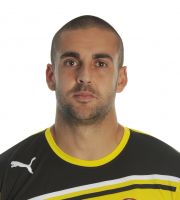
Adam Federici
Reading career: 2005-2015
206+3 appearances
1 goal
Claim to fame: Another of our goalscoring goalkeepers
Aussie Adam worked tremendously hard to get a role at Reading and had to bide his time to make the first team ‘green’ jersey his own. He was agile shot-stopper and very occasional goal-scorer, once netting an injury time equaliser against Cardiff and another scoring when playing outfield in a friendly.
Read more...
Adam won a EFL Championship medal in 2012 and played in the PL with Reading and later Bournemouth and won caps for Australia.
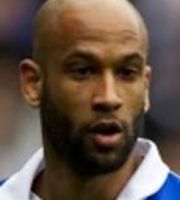
Jimmy Kebe
Reading career: 2008-2013
149+26 appearances
29 goals
Claim to fame: A winger with searing pace and a strange sock routine!
Spectacularly speedy, tall French winger who became a cult hero at Reading for his raiding runs down the right. He signed in 2008 and moved to Crystal Palace after our relegation in 2013. An enigmatic player who, on his day, could torture full-backs with his pace and control.
Read more...
Jimmy was part of the squad that won the Championship in the 2011-12 season. Best remembered for scoring the FA Cup’s fastest goal, after just 9 seconds v West Brom in 2010 and for pulling his socks up whilst dribbling v West Ham a year later – the infamous Sockgate incident! When he finally retired from football, Jimmy became a professional poker player.

Adam Le Fondre
Reading career: 2011-2014
53+51 appearances
39 goals
Claim to fame: Premier League player of the month without even starting a match!
Scored the goal that was to win us the 2011-12 Championship title, then went on to finish our top scorer in the following Premier League season. In doing so he became the highest scoring substitute in a season, the only Reading player to win Premier League Player of the Month, in January 2012, and the only player to win that award without starting a game in the month! Alfie averaged a Premier League goal every 124.4 minutes, the fourth best record in Premier League history.
Read more...
Back in the Championship, he knocked in a hat-trick in our Madstad record 7-1 win over Bolton. Later moved to Cardiff C for a large fee and is currently (Aug 2022) still playing in Australia for Sydney FC.
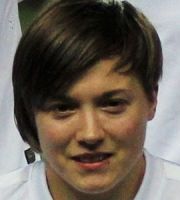
Fran Kirby
Reading career: 2012-2015
48 appearances
68 goals
Claim to fame: First professional contract with Reading Women before going on to be a superstar
Hometown girl Kirby became the first woman to be offered a professional contract by Reading in 2014. As a high scoring forward she received international recognition whilst at Reading, making her England debut in 2014 and playing in the early stages of the 2015 World Cup in Canada. After 3 years in the Reading 1st team Fran was then sold to Chelsea for £50,000 where her career at club and international levels has continued with great success.
Read more...
She competed in the 2020 Olympic Games and England women’s 2022 Euros triumph, is now Chelsea Women’s top ever scorer and a nationally known figure.

